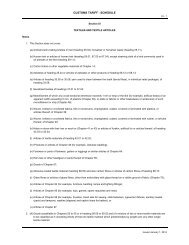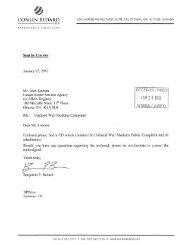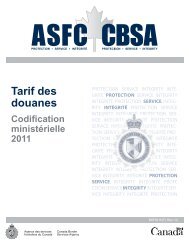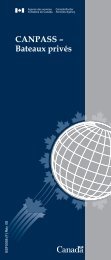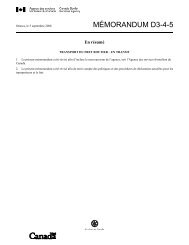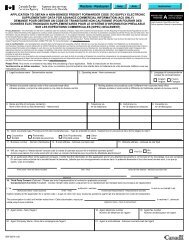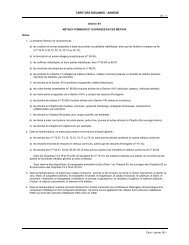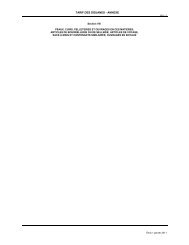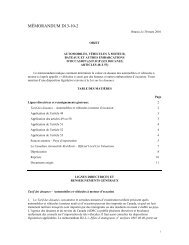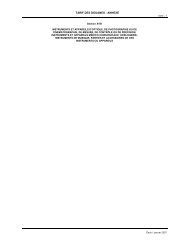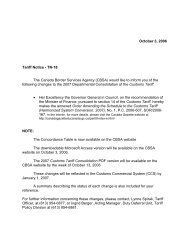D19-14-1 Cross-Border Currency and Monetary Instruments Reporting
D19-14-1 Cross-Border Currency and Monetary Instruments Reporting
D19-14-1 Cross-Border Currency and Monetary Instruments Reporting
Create successful ePaper yourself
Turn your PDF publications into a flip-book with our unique Google optimized e-Paper software.
Ottawa, August 19, 2009<br />
MEMORANDUM <strong>D19</strong>-<strong>14</strong>-1<br />
In Brief<br />
CROSS-BORDER CURRENCY AND MONETARY INSTRUMENTS REPORTING<br />
The French version of Memor<strong>and</strong>um <strong>D19</strong>-<strong>14</strong>-1, dated May 16, 2008 contains incomplete information in section 36.<br />
Please replace page 6 of the French version with the page hereby attached.
Ottawa, May 16, 2008<br />
MEMORANDUM <strong>D19</strong>-<strong>14</strong>-1<br />
CROSS-BORDER CURRENCY AND MONETARY<br />
INSTRUMENTS REPORTING<br />
This memor<strong>and</strong>um explains the legislative <strong>and</strong><br />
regulatory provisions, guidelines, <strong>and</strong> procedures associated<br />
with the requirement to report to the CBSA the physical<br />
cross-border movement of currency or monetary<br />
instruments.<br />
TABLE OF CONTENTS<br />
Page<br />
Legislation 1<br />
<strong>Cross</strong>-<strong>Border</strong> <strong>Currency</strong> <strong>and</strong> <strong>Monetary</strong> <strong>Instruments</strong><br />
<strong>Reporting</strong> Regulations 1<br />
Definitions 1<br />
<strong>Reporting</strong> of Importations <strong>and</strong> Exportations 2<br />
Guidelines <strong>and</strong> General Information 3<br />
General Manner of <strong>Reporting</strong> – Forms 4<br />
Completed Forms 4<br />
Import <strong>Reporting</strong> 4<br />
Export <strong>Reporting</strong> 5<br />
<strong>Reporting</strong> exceptions 5<br />
Exemption Applicable to Imported Shares Exception 5<br />
Duty to Answer <strong>and</strong> Comply 5<br />
Verification 6<br />
Retention 6<br />
Seizures 6<br />
Request for Review of a Seizure Process 6<br />
Third-party Claims 7<br />
Disclosure of Information 7<br />
Additional Information 7<br />
Appendix A – Form E677, <strong>Cross</strong>-<strong>Border</strong> Currenc<br />
or Money <strong>Instruments</strong> Repor<br />
– Individual 8<br />
Appendix B – Form E667, <strong>Cross</strong>-<strong>Border</strong> <strong>Currency</strong><br />
or Money <strong>Instruments</strong> Report<br />
– General 10<br />
Appendix C – Form E668, <strong>Cross</strong>-<strong>Border</strong> <strong>Currency</strong><br />
or Money <strong>Instruments</strong> Report Made by<br />
Person in Charge of Conveyance 12<br />
Legislation<br />
Proceeds of Crime (Money Laundering) <strong>and</strong> Terrorist<br />
Financing Act (PCMLTFA)<br />
Part 2 - <strong>Reporting</strong> of currency <strong>and</strong> monetary instruments<br />
<strong>Cross</strong>-<strong>Border</strong> <strong>Currency</strong> <strong>and</strong> <strong>Monetary</strong> <strong>Instruments</strong><br />
<strong>Reporting</strong> Regulations<br />
DEFINITIONS<br />
1. (1) The following definitions apply in the Act <strong>and</strong><br />
these Regulations.<br />
“courier” means a commercial carrier that is engaged in<br />
scheduled international transportation of shipments of<br />
goods other than goods imported or exported as mail.<br />
(messager).<br />
“monetary instruments” means the following instruments in<br />
bearer form or in such other form as title to them passes<br />
on delivery, namely,<br />
(a) securities, including stocks, bonds, debentures <strong>and</strong><br />
treasury bills; <strong>and</strong><br />
(b) negotiable instruments, including bank drafts,<br />
cheques, promissory notes, travellers’ cheques <strong>and</strong><br />
money orders, other than warehouse receipts or bills of<br />
lading.<br />
For greater certainty, this definition does not apply to<br />
securities or negotiable instruments that bear restrictive<br />
endorsements or a stamp for the purposes of clearing or<br />
are made payable to a named person <strong>and</strong> have not been<br />
endorsed. (effets)<br />
(2) The following definitions apply in these<br />
Regulations.<br />
“Act” means the Proceeds of Crime (Money Laundering)<br />
<strong>and</strong> Terrorist Financing Act. (Loi)<br />
“cargo ship” means a commercial vessel that is engaged in<br />
international transportation of shipments of goods other<br />
than goods imported or exported as mail. (navire de<br />
charge)<br />
“commercial passenger conveyance” means a conveyance<br />
that is used to carry passengers who have paid for<br />
passage. (moyen de transport commercial de<br />
passagers)<br />
“conveyance” means any vehicle, aircraft or water-borne<br />
craft, or other contrivance that is used to move persons,<br />
goods, currency or monetary instruments. (moyen de<br />
transport)<br />
“cruise ship” means a commercial vessel that has sleeping<br />
facilities for over 70 persons who are not crew<br />
members but does not include a vessel engaged in<br />
passenger or cargo ferry service. (navire de croisière)<br />
“emergency” means a medical emergency, fire, flood or<br />
other disaster that threatens life, property or the<br />
environment. (urgence)<br />
“non-commercial passenger conveyance” means a<br />
conveyance that does not have aboard any person who<br />
has paid for passage <strong>and</strong> includes corporate aircraft,
2<br />
private aircraft <strong>and</strong> marine pleasure craft. (moyen de<br />
transport non commercial de passagers)<br />
“transfer agent” means a person or entity appointed by a<br />
corporation to maintain records of stock, debenture <strong>and</strong><br />
bond owners, to cancel <strong>and</strong> issue certificates <strong>and</strong> to<br />
send out dividend cheques. (agent de transfert)<br />
REPORTING OF IMPORTATIONS AND EXPORTATIONS<br />
Minimum Value of <strong>Currency</strong> or <strong>Monetary</strong> <strong>Instruments</strong><br />
2. (1) For the purposes of reporting the importation or<br />
exportation of currency or monetary instruments of a certain<br />
value under subsection 12(1) of the Act, the prescribed<br />
amount is $10,000.<br />
(2) The prescribed amount is in Canadian dollars or its<br />
equivalent in a foreign currency, based on<br />
(a) the official conversion rate of the Bank of Canada<br />
as published in the Bank of Canada’s Daily<br />
Memor<strong>and</strong>um of Exchange Rates that is in effect at the<br />
time of importation or exportation; or<br />
(b) if no official conversion rate is set out in that<br />
publication for that currency, the conversion rate that<br />
the person or entity would use for that currency in the<br />
normal course of business at the time of the importation<br />
or exportation.<br />
General Manner of <strong>Reporting</strong><br />
3. Subject to subsections 4(3) <strong>and</strong> (3.1) <strong>and</strong> section 8, a<br />
report with respect to the importation or exportation of<br />
currency or monetary instruments shall<br />
(a) be made in writing;<br />
(b) contain the information referred to<br />
(i) in Schedule 1, in the case of a report made by<br />
the person described in paragraph 12(3)(a) of the<br />
Act, if that person is not transporting on behalf of<br />
an entity or other person,<br />
(ii) in Schedule 2, in the case of a report made by<br />
the person described in paragraph 12(3)(a) of the<br />
Act, if that person is transporting on behalf of an<br />
entity or other person,<br />
(iii) in Schedule 2, in the case of a report made by<br />
the person or entity described in paragraph<br />
12(3)(b), (c) or (e) of the Act, <strong>and</strong><br />
(iv) in Schedule 3, in the case of a report made by<br />
the person described in paragraph 12(3)(d) of the<br />
Act;<br />
(c) contain a declaration that the statements made in<br />
the report are true, accurate <strong>and</strong> complete; <strong>and</strong><br />
(d) be signed <strong>and</strong> dated by the person or entity<br />
described in paragraph 12(3)(a), (b), (c), (d) or (e) of<br />
the Act, as applicable.<br />
Importation <strong>Reporting</strong><br />
4. (1) Subject to subsections (2) to (5) <strong>and</strong> section 9, a<br />
report with respect to currency or monetary instruments<br />
transported by a person arriving in Canada shall be<br />
submitted without delay by the person at the customs office<br />
located at the place of importation or, if it is not open for<br />
business at the time of importation, at the nearest customs<br />
office that is open for business at that time.<br />
(2) A report with respect to currency or monetary<br />
instruments transported by a person arriving in Canada on<br />
board a commercial passenger conveyance who has as their<br />
destination another place in Canada at which there is a<br />
customs office may be submitted without delay by the<br />
person at that customs office or, if it is not open for business<br />
at the time of importation, at the nearest customs office that<br />
is open for business at that time, on condition that<br />
(a) the person does not disembark from the<br />
conveyance at the place of arrival in Canada <strong>and</strong> the<br />
currency or monetary instruments are not removed<br />
from the conveyance at that place, other than to be<br />
transferred under customs control directly to a<br />
commercial passenger conveyance for departure to the<br />
other place in Canada or directly to a holding area<br />
designated as such for the purposes of the Presentation<br />
of Persons (Customs) Regulations; <strong>and</strong><br />
(b) if the person <strong>and</strong> currency or monetary instruments<br />
are transferred under customs control directly to a<br />
designated holding area, the person does not leave <strong>and</strong><br />
the currency or monetary instruments are not removed<br />
from that area, other than to board or to be loaded on<br />
board a commercial passenger conveyance for<br />
departure to the other place in Canada.<br />
(3) A report with respect to currency or monetary<br />
instruments transported by a person arriving in Canada on<br />
board a non-commercial passenger conveyance at a customs<br />
office where, under the Customs Act, customs reporting may<br />
be done by radio or telephone may be submitted by radio or<br />
telephone to an officer by that person or the person in<br />
charge of the conveyance at that location, on condition that<br />
(a) when the person informs the officer of their arrival<br />
for the purposes of section 11 of the Customs Act, they<br />
provide the information referred to in Schedule 1, 2<br />
or 3, as applicable; <strong>and</strong><br />
(b) on the officer's request, they present themselves<br />
<strong>and</strong> make available for examination the currency or<br />
monetary instruments at the time <strong>and</strong> place specified by<br />
the officer.<br />
(3.1) A report with respect to currency or monetary<br />
instruments transported by a person arriving in Canada on<br />
board a non-commercial passenger conveyance, at a<br />
customs office where the person is authorized in accordance<br />
with the Presentation of Persons (2003) Regulations to<br />
present in an alternative manner, may be submitted to an<br />
Memor<strong>and</strong>um <strong>D19</strong>-<strong>14</strong>-1 May 16, 2008
3<br />
officer by telephone, by that person or the person in charge<br />
of the conveyance before arriving in Canada, on condition<br />
that<br />
(a) when the person informs the officer of their arrival<br />
for the purposes of section 11 of the Customs Act, they<br />
provide the information referred to in Schedule 1, 2<br />
or 3, as applicable; <strong>and</strong><br />
(b) on the officer's request, they present themselves<br />
<strong>and</strong> make available for examination the currency or<br />
monetary instruments on arrival in Canada at the time<br />
<strong>and</strong> place specified by the officer.<br />
(4) A report with respect to currency or monetary<br />
instruments transported by a freight train crew member<br />
arriving in Canada on board the freight train shall be<br />
submitted without delay by the crew member at the customs<br />
office specified by the officer when the crew member<br />
presents himself or herself in accordance with section 11 of<br />
the Customs Act.<br />
(5) A report with respect to currency or monetary<br />
instruments that are transported by courier into Canada on<br />
board an aircraft <strong>and</strong> that have as their destination another<br />
place in Canada at which there is a customs office, shall be<br />
submitted at the customs office located at the airport of<br />
destination shown on the air waybill, on condition that<br />
(a) the currency or monetary instruments are not<br />
removed from the aircraft at the place of arrival, other<br />
than to be transferred under customs control directly to<br />
a holding area designated as such for the purposes of<br />
the Presentation of Persons (Customs) Regulations;<br />
<strong>and</strong><br />
(b) if the currency or monetary instruments are<br />
transferred under customs control directly to a<br />
designated holding area, they are not removed from that<br />
area, other than to be loaded on board an aircraft for<br />
departure to the other place in Canada.<br />
5. Subject to section 10, a report made by an exporter<br />
with respect to the importation of currency or monetary<br />
instruments by mail shall be made by<br />
(a) including inside the mail item an importation<br />
report with respect to the currency or monetary<br />
instruments; <strong>and</strong><br />
(b) affixing the customs declaration form required by<br />
the Universal Postal Convention, as amended from<br />
time to time, to the outside of the mail item <strong>and</strong><br />
indicating that it contains currency or monetary<br />
instruments.<br />
6. A report made with respect to the importation of<br />
currency or monetary instruments that have been retained<br />
under section <strong>14</strong> of the Act shall be submitted by the person<br />
or entity to whom the notice was given at the customs office<br />
indicated on the notice.<br />
7. A report with respect to the importation of currency<br />
or monetary instruments, other than one referred to in<br />
sections 4 to 6, shall be submitted without delay at the<br />
customs office that is open for business at the time of the<br />
importation <strong>and</strong> that is nearest to the place of importation.<br />
8. In an emergency, the person in charge of a<br />
conveyance who must unload currency or monetary<br />
instruments from the conveyance before being able to make<br />
or submit an importation report in accordance with these<br />
Regulations may submit the importation report by telephone<br />
or other expedient means <strong>and</strong>, as soon as possible after that,<br />
shall make or submit a report in accordance with these<br />
Regulations.<br />
Exportation <strong>Reporting</strong><br />
9. A report with respect to currency or monetary<br />
instruments transported by a person departing from Canada<br />
shall be submitted without delay by the person at the<br />
customs office located at the place of exportation or, if it is<br />
not open for business at the time of exportation, at the<br />
nearest customs office that is open for business at that time.<br />
10. A report required to be made by an exporter with<br />
respect to the exportation by mail of currency or monetary<br />
instruments shall be made by<br />
(a) including an exportation report inside the mail<br />
item; <strong>and</strong><br />
(b) mailing or submitting, at or before the time when<br />
the currency or monetary instruments are mailed, a<br />
copy of the exportation report to the customs office that<br />
is located nearest to the point at which the item was<br />
mailed.<br />
11. A report made with respect to the exportation of<br />
currency or monetary instruments that have been retained<br />
under section <strong>14</strong> of the Act shall be submitted by the person<br />
or entity to whom the notice was given at the customs office<br />
indicated on the notice.<br />
12. A report with respect to the exportation of currency<br />
or monetary instruments, other than one referred to in<br />
sections 11 to 13, shall be submitted without delay at the<br />
customs office that is open for business at the time of<br />
exportation <strong>and</strong> that is nearest to the place of exportation.<br />
GUIDELINES AND<br />
GENERAL INFORMATION<br />
1. The Act <strong>and</strong> its Regulations require imports <strong>and</strong> exports<br />
of CAN$10,000 or more or its equivalent in currency or<br />
monetary instruments (or the equivalent in a foreign<br />
currency, based on the official conversion rate) to be<br />
reported to a border services officer.<br />
Memor<strong>and</strong>um <strong>D19</strong>-<strong>14</strong>-1 May 16, 2008
4<br />
GENERAL MANNER OF REPORTING – FORMS<br />
2. Importers <strong>and</strong> exporters must complete, sign, <strong>and</strong><br />
submit the following forms to report their imports <strong>and</strong><br />
exports of currency or monetary instruments:<br />
(a) Form E677, <strong>Cross</strong>-<strong>Border</strong> <strong>Currency</strong> or Money<br />
<strong>Instruments</strong> Report – Individual, is used to report<br />
situations where currency or monetary instruments are<br />
physically carried by a person arriving in or departing<br />
from Canada, or where they form part of the person’s<br />
baggage <strong>and</strong> that person <strong>and</strong> his or her baggage are<br />
being carried on board the same conveyance across the<br />
border. See Appendix A for a copy of this form.<br />
(b) Form E667, <strong>Cross</strong>-<strong>Border</strong> <strong>Currency</strong> or Money<br />
<strong>Instruments</strong> Report – General, is used to report all<br />
other situations, including mailing, shipping by courier,<br />
or transporting currency or monetary instruments on<br />
someone else’s behalf. In the case of mail, the exporter<br />
who is sending the currency or monetary instruments to<br />
Canada has to affix Form CN23, CBSA Declaration<br />
Form, to the outside of the mail item <strong>and</strong> include a<br />
completed Form E667 inside. See Appendix B for a<br />
copy of this form.<br />
(c) Form E668, <strong>Cross</strong>-<strong>Border</strong> <strong>Currency</strong> or Money<br />
<strong>Instruments</strong> Report Made by Person in Charge of<br />
Conveyance, is used to consolidate all currency <strong>and</strong><br />
monetary instruments transported by the person in<br />
charge of a conveyance. The importer or exporter must<br />
also complete Form E667. See Appendix C for a copy<br />
of Form E668.<br />
3. Import <strong>and</strong> export reporting require the same forms <strong>and</strong><br />
data. Completed forms that are submitted <strong>and</strong> that comply<br />
with the conditions of this policy will be considered to meet<br />
the reporting requirements of the Act.<br />
COMPLETED FORMS<br />
4. Completed forms must be sent to the CBSA’s<br />
Enforcement Branch by first-class mail using a single<br />
gum-sealed envelope with no security marking or, where<br />
available, through inter-office mail in a reusable envelope.<br />
5. The CBSA captures data from completed forms <strong>and</strong><br />
forwards it to the Financial Transactions <strong>and</strong> Reports<br />
Analysis Centre of Canada (FINTRAC). FINTRAC is<br />
Canada’s financial intelligence unit, a specialized agency<br />
created to collect <strong>and</strong> analyze financial information <strong>and</strong><br />
intelligence on suspected money laundering <strong>and</strong> terrorist<br />
financing activities. Forms are to be batched weekly by the<br />
CBSA office <strong>and</strong> sent to:<br />
Information Sharing Section<br />
Enforcement Branch<br />
191 Laurier Avenue West<br />
10th floor, Sir Richard Scott Building<br />
Ottawa ON K1A 0L8<br />
IMPORT REPORTING<br />
Imports by mail<br />
6. An exporter who sends currency or monetary<br />
instruments to Canada has to affix Form CN23, CBSA<br />
Declaration Form, to the outside of the mail item <strong>and</strong><br />
include a completed Form E667 inside. If a declaration form<br />
indicates currency or monetary instruments, but Form E667<br />
is either missing or incomplete, the currency will be<br />
retained <strong>and</strong> a retention notice will be sent to the importer.<br />
7. Other postal requirements may apply when you import<br />
or export currency or monetary instruments by mail.<br />
Contact Canada Post Corporation for more information at<br />
www.canadapost.ca. <strong>Currency</strong> mailed from a location<br />
outside of Canada to another destination outside of Canada<br />
but that transits Canada through the course of post does not<br />
have to be reported (e.g., currency or monetary instruments<br />
mailed from France to St-Pierre et Miquelon).<br />
Imports by rail<br />
8. The person in charge of a conveyance has to report the<br />
currency or monetary instruments at the nearest CBSA<br />
office that is open for business. If the currency or monetary<br />
instruments are in the actual possession of a person, it will<br />
be that person’s responsibility to report them to the nearest<br />
CBSA office that is open for business. <strong>Currency</strong> or<br />
monetary instruments that are in the actual possession of the<br />
crew member aboard a freight train must be reported at the<br />
place specified by a border services officer.<br />
Commercial imports by air<br />
9. <strong>Currency</strong> or monetary instruments that are transported<br />
by an air transportation company should be reported at the<br />
CBSA office for the destination airport shown on the air<br />
waybill.<br />
<strong>Reporting</strong> at point of clearance<br />
10. When a person on board a commercial carrier arrives in<br />
Canada but is destined for another place in Canada, the<br />
currency or monetary instruments declaration must be made<br />
at the CBSA office where the traveller disembarks <strong>and</strong> is<br />
required to clear customs.<br />
In-transit passengers<br />
11. Passengers aboard a commercial conveyance transiting<br />
through Canada do not have to report currency or monetary<br />
instruments in their possession as long as they are not<br />
removed, other than to be transferred under CBSA control<br />
to another commercial conveyance for departure to a place<br />
outside of Canada. A currency or monetary instruments<br />
report must be made if the passenger disembarks at a point<br />
where he or she is required to clear customs.<br />
Memor<strong>and</strong>um <strong>D19</strong>-<strong>14</strong>-1 May 16, 2008
5<br />
Telephone reporting<br />
12. Established methods of reporting that involve the<br />
Telephone <strong>Reporting</strong> Centre (TRC) may be used for<br />
declaring currency or monetary instruments<br />
(i.e., CANPASS Aircraft <strong>and</strong> Private Boat). The<br />
Regulations allow for persons who report to a border<br />
services officer by telephone to make a currency or<br />
monetary instruments declaration. The border services<br />
officer at the TRC will complete the form on the person’s<br />
behalf. No signature will be required on the form.<br />
Self-reporting modes<br />
13. The Act requires that currency or monetary instruments<br />
be reported to an officer. Therefore, the various methods of<br />
self-reporting to CBSA (CANPASS Highway, NEXUS, etc.)<br />
may not be used to report currency or monetary instruments.<br />
Any other imports<br />
<strong>14</strong>. In any other situation, the person on whose behalf the<br />
currency or monetary instruments are imported has to report<br />
the currency or monetary instruments at the place where<br />
they are imported.<br />
Emergency imports<br />
15. In an emergency situation, a person in charge of a<br />
conveyance may unload currency or monetary instruments<br />
before making a currency or monetary instruments report.<br />
The person in charge of the conveyance may make a report<br />
by telephone, or other means, <strong>and</strong> as soon as possible make<br />
a written currency or monetary instruments report.<br />
EXPORT REPORTING<br />
Individuals<br />
16. <strong>Currency</strong> or monetary instruments that are in the actual<br />
possession of a person, or that form part of that person’s<br />
baggage if the person <strong>and</strong> baggage are being carried on<br />
board the same conveyance, must be reported at the CBSA<br />
office nearest to the place of export that is open for<br />
business.<br />
Commercial exports<br />
17. <strong>Currency</strong> or monetary instruments that are exported by<br />
a courier must be reported by the person in charge of the<br />
conveyance at the place of export.<br />
Exports by mail<br />
18. For currency or monetary instruments exports by mail,<br />
the exporter has to complete Form E667 <strong>and</strong> include a copy<br />
of the form inside the mailed item. The exporter also has to<br />
mail or submit a copy of the form to the nearest CBSA<br />
office before or when the item is mailed.<br />
Telephone reporting<br />
19. No provisions exist to use the TRC to report exports of<br />
currency or monetary instruments at this time.<br />
Any other exports<br />
20. In any other situation, the person on whose behalf the<br />
currency or monetary instruments are being exported must<br />
make the currency or monetary instruments report at the<br />
CBSA office at the place of export.<br />
REPORTING EXCEPTIONS<br />
Diplomats<br />
21. It is the CBSA’s policy, in accordance with these policy<br />
guidelines, to give precedence to the provisions of the<br />
Foreign Missions <strong>and</strong> International Organizations Act, over<br />
the reporting requirements of the Act.<br />
Bank of Canada<br />
22. The Act exempts the Bank of Canada from all<br />
requirements to report imports or exports of currency or<br />
monetary instruments.<br />
EXEMPTION APPLICABLE TO IMPORTED SHARES<br />
EXCEPTION<br />
23. A person or entity is not required to make a report<br />
under subsection 12(1) of the Act with respect to stocks,<br />
bonds <strong>and</strong> debentures imported into Canada by courier or as<br />
mail if the importer is a financial entity or a securities dealer<br />
as defined in subsection 1(2) of the Proceeds of Crime<br />
(Money Laundering) <strong>and</strong> Terrorist Financing Regulations<br />
or a transfer agent.<br />
DUTY TO ANSWER AND COMPLY<br />
24. A person who reports currency or monetary instruments<br />
has to answer truthfully any questions that a border services<br />
officer asks about the information required for the report.<br />
25. A person who makes the report has to present the<br />
currency or monetary instruments, unload any conveyance<br />
or part of a conveyance or baggage, <strong>and</strong> open or unpack any<br />
package or container that a border services officer wishes to<br />
examine.<br />
Cancelling reports<br />
26. A person who declares currency or monetary<br />
instruments may, up to the time of a full report, advise that<br />
he or she no longer wishes to proceed with the import or<br />
export. Without a report, the person will be allowed to<br />
withdraw his or her intent to enter or exit Canada. However,<br />
this right does not apply to unreported currency or monetary<br />
instruments.<br />
Memor<strong>and</strong>um <strong>D19</strong>-<strong>14</strong>-1 May 16, 2008
6<br />
VERIFICATION<br />
27. When a person reports currency or monetary<br />
instruments, a border services officer may examine the<br />
currency or monetary instruments to verify the report.<br />
Searching persons<br />
28. If an officer has reasonable grounds to suspects that the<br />
Act has been violated, or that a person is attempting to<br />
circumvent the Act, the officer may search:<br />
(a) any person who has arrived in Canada, within a<br />
reasonable time after the person’s arrival in Canada;<br />
(b) any person who is about to leave Canada at any<br />
time before his or her departure; or<br />
(c) any person who has had access to an area<br />
designated for use by persons about to leave Canada,<br />
<strong>and</strong> who leaves that area but does not leave Canada,<br />
within a reasonable time after the person leaves<br />
the area.<br />
Searching conveyances<br />
29. An officer may, in order to determine whether there<br />
are, on or about a conveyance, currency or monetary<br />
instruments of a value equal to or greater than the amount<br />
prescribed, search a conveyance for violations of the Act.<br />
The officer may stop, board, <strong>and</strong> search the conveyance,<br />
examine anything in or on it, open or cause to be opened<br />
any package or container in or on it, <strong>and</strong> direct the<br />
conveyance to be moved to a CBSA office or other suitable<br />
place for the search.<br />
Searching baggage<br />
30. An officer may, in order to determine whether there<br />
are, in baggage, currency or monetary instruments of a<br />
value equal to or greater than the amount prescribed search<br />
the baggage, examine anything in it, open or cause to be<br />
opened any package or container in it, <strong>and</strong> direct the<br />
baggage be moved to a CBSA office or other suitable place<br />
for the search.<br />
Searching mail<br />
31. An officer may examine <strong>and</strong> open any mail that weighs<br />
more than 30 grams if he or she has reasonable grounds to<br />
suspect it contains CAN$10,000 or more in currency or<br />
monetary instruments. This is to be done in the presence of<br />
another officer when <strong>and</strong> if feasible. An officer may not<br />
examine <strong>and</strong> open any mail that weighs 30 grams or less<br />
unless the person to whom it is addressed consents or the<br />
person who sent it consents or has completed <strong>and</strong> attached<br />
Form CN23, CBSA Declaration Form, in accordance with<br />
article 116 of the Detailed Regulations of the Universal<br />
Postal Convention.<br />
RETENTION<br />
32. When a person indicates that he or she has currency or<br />
monetary instruments to report but cannot or fails to<br />
complete a cross-border currency or monetary instruments<br />
report at that time, the officer may retain the currency or<br />
monetary instruments until the report is complete. The<br />
officer will give the importer written notice in person or by<br />
registered mail that the currency has been retained. When<br />
currency sent by courier or mail is retained, the officer will<br />
notify the exporter. If the exporter’s address is not known,<br />
the officer will notify the importer. The notice shall be<br />
given or sent without delay within 60 days of retention.<br />
33. The importer or exporter must satisfy the officer that<br />
the currency or monetary instruments have been reported or<br />
that they have decided not to proceed with the import or<br />
export within 30 days following the issuance of the<br />
retention notice for courier or mail imports or exports. In all<br />
other cases, a full report of the currency or monetary<br />
instruments must be made within seven days of the issuance<br />
of the retention notice. If the requirements are not met<br />
within the prescribed period, the currency or monetary<br />
instruments will be considered ab<strong>and</strong>oned to the Crown.<br />
SEIZURES<br />
34. If an officer has reasonable grounds to believe that<br />
subsection 12(1) of the Act (reporting requirements) has<br />
been violated, he or she may seize the currency as forfeit<br />
<strong>and</strong> applicable terms of release will be offered.<br />
35. If an officer suspects on reasonable grounds that the<br />
non-reported currency or monetary instruments are proceeds<br />
of crime or terrorist finances, the officer may seize the<br />
currency with no terms of release.<br />
Transfers of monies<br />
36. <strong>Currency</strong> or monetary instruments that are forfeited or<br />
seized, <strong>and</strong> the financial penalties collected under the Act,<br />
must be promptly deposited or forwarded directly to Public<br />
Works <strong>and</strong> Government Services Canada (PWGSC), Seized<br />
Property Management Directorate (SPMD).<br />
REQUEST FOR REVIEW OF A SEIZURE PROCESS<br />
37. Under subsection 24.1 of the Act, the Minister, or an<br />
officer designated by the President for the purpose of this<br />
section, may, within 30 days after a seizure or an<br />
assessment of a penalty, cancel the seizure, or cancel or<br />
refund the penalty or reduce a penalty or refund the excess<br />
amount of the penalty collected in respect of unreported<br />
currency.<br />
38. Under subsection 12 (1) of the Act, a person from<br />
whom currency or monetary instruments were seized, or the<br />
lawful owner, has 90 days after the date of the seizure to<br />
request a decision of the Minister on whether the reporting<br />
requirement was contravened. Requests for review must be<br />
made in writing to the officer who seized the currency or<br />
Memor<strong>and</strong>um <strong>D19</strong>-<strong>14</strong>-1 May 16, 2008
7<br />
monetary instruments or to an officer at the CBSA office<br />
closest to the place where the seizure took place.<br />
39. The request for review must be sent to the<br />
Adjudications Division at the following address:<br />
Adjudication Division<br />
Canada <strong>Border</strong> Services Agency<br />
25 Nicholas Street, 20th floor<br />
Ottawa ON K1A OL5<br />
40. Once the Adjudications Division receives the request it<br />
will send a Notice of Reasons by registered mail to the<br />
person who requested a review, outlining the circumstances<br />
of the seizure.<br />
41. When money laundering or terrorist financing charges<br />
are laid in connection with the seizure, the Adjudications<br />
Division has 30 days after court proceedings conclude to<br />
render a decision.<br />
42. If the Adjudications Division finds that there has been<br />
no contravention, it will notify PWGSC/SPMD to refund<br />
the penalty that was paid for return of the currency, return<br />
the monetary instruments, or return an amount equal to the<br />
value of the money seized.<br />
43. A person has 90 days after he or she is notified of a<br />
decision to request an appeal to the Federal Court of<br />
Canada. When the matter is brought before the Trial<br />
Division of the Federal Court, it will be turned over to the<br />
Department of Justice. The Adjudications Division will<br />
continue to oversee <strong>and</strong> instruct legal counsel on the<br />
proceedings <strong>and</strong> will have the final say in the disposition of<br />
any appeal.<br />
THIRD-PARTY CLAIMS<br />
44. The Act permits third parties to file claims. A third<br />
party who claims interest in the seized currency or monetary<br />
instruments has 90 days after the seizure to apply in writing<br />
to the court for a claim. The court that receives the request<br />
shall hear the appeal within 30 days of receiving the<br />
application.<br />
45. The person who makes the claim has to serve notice of<br />
the application <strong>and</strong> of the hearing to the President or an<br />
officer designated by the President (Adjudications<br />
Division). If civil litigation becomes necessary, the case will<br />
be turned over to the Department of Justice, <strong>and</strong> the<br />
Adjudications Division will oversee <strong>and</strong> instruct legal<br />
counsel on the proceedings <strong>and</strong> will have the final say in the<br />
position taken by the CBSA in contesting a third-party<br />
application.<br />
46. The applicant must prove that his or her interest in the<br />
currency or monetary instruments was acquired in good<br />
faith before the contravention, that he or she is innocent of<br />
any complicity resulting in the contravention, <strong>and</strong> that he or<br />
she exercised reasonable care to ensure that the currency or<br />
monetary instruments would be reported.<br />
47. In accordance with the court order, the Adjudications<br />
Division will instruct the Minister of Public Works <strong>and</strong><br />
Government Services to return to the applicant the currency<br />
or monetary instruments or an amount calculated on the<br />
basis of their interest as declared in the court order. Either<br />
the CBSA or the person making the application may appeal<br />
an order made by the court.<br />
DISCLOSURE OF INFORMATION<br />
Disclosure by the CBSA<br />
48. Information obtained under the Act is not CBSA<br />
information <strong>and</strong> can only be used <strong>and</strong> disclosed as provided<br />
for under the Act, except for information from reports that<br />
is forwarded to FINTRAC.<br />
49. Information obtained under this Act may be used<br />
internally when it is relevant in the administration <strong>and</strong><br />
enforcement of the Act, the Immigration <strong>and</strong> Refugee<br />
Protection Act or the Customs Act.<br />
50. Information gathered as a result of administering or<br />
enforcing the Act may be disclosed to the appropriate police<br />
force if an officer has reasonable grounds to suspect that the<br />
information would be relevant to investigating or<br />
prosecuting a money laundering or terrorist financing<br />
offence.<br />
51. Officers may disclose information to FINTRAC if they<br />
have reasonable grounds to suspect that the information<br />
would help the Centre detect, prevent, or deter money<br />
laundering or terrorist financing.<br />
Disclosure by FINTRAC<br />
52. The Act permits FINTRAC to disclose information to<br />
the CBSA if it determines the information to be relevant to<br />
an offence is related to the importation of goods which are<br />
prohibited, controlled or regulated under the Customs Act or<br />
other statutes , money laundering, or terrorist financing<br />
activities.<br />
ADDITIONAL INFORMATION<br />
53. For more information, contact:<br />
<strong>Cross</strong>-<strong>Border</strong> <strong>Currency</strong> <strong>Reporting</strong> Program<br />
Enforcement Programs Directorate<br />
13th floor, Sir Richard Scott Building<br />
191 Laurier Avenue West<br />
Ottawa ON K1A OL8<br />
Email: CBSA-ASFC-Dist_<strong>Currency</strong><br />
54. For the most recent information on reporting<br />
cross-border currency <strong>and</strong> monetary instruments, contact<br />
the CBSA’s free <strong>Border</strong> Information Service (BIS) at<br />
1-800-461-9999. If you are calling from outside of Canada,<br />
you can access BIS by calling (204) 983-3500 or<br />
(506) 636-5064. Long distance charges will apply. You can<br />
also visit our Web site at: www.cbsa.gc.ca.<br />
Memor<strong>and</strong>um <strong>D19</strong>-<strong>14</strong>-1 May 16, 2008
8<br />
APPENDIX A<br />
FORM E677, CROSS-BORDER CURRENCY OR MONEY INSTRUMENTS REPORT – INDIVIDUAL<br />
Memor<strong>and</strong>um <strong>D19</strong>-<strong>14</strong>-1 May 16, 2008
9<br />
FORM E677, CROSS-BORDER CURRENCY OR MONEY INSTRUMENTS REPORT – INDIVIDUAL<br />
(back of form)<br />
Memor<strong>and</strong>um <strong>D19</strong>-<strong>14</strong>-1 May 16, 2008
APPENDIX B<br />
10<br />
FORM E667, CROSS-BORDER CURRENCY OR MONEY INSTRUMENTS REPORT – GENERAL<br />
Memor<strong>and</strong>um <strong>D19</strong>-<strong>14</strong>-1 May 16, 2008
11<br />
FORM E667, CROSS-BORDER CURRENCY OR MONEY INSTRUMENTS REPORT – GENERAL<br />
(back of form)<br />
Memor<strong>and</strong>um <strong>D19</strong>-<strong>14</strong>-1 May 16, 2008
12<br />
APPENDIX C<br />
FORM E668, CROSS-BORDER CURRENCY OR MONEY INSTRUMENTS REPORT<br />
MADE BY PERSON IN CHARGE OF CONVEYANCE<br />
Memor<strong>and</strong>um <strong>D19</strong>-<strong>14</strong>-1 May 16, 2008
13<br />
FORM E668, CROSS-BORDER CURRENCY OR MONEY INSTRUMENTS REPORT<br />
MADE BY PERSON IN CHARGE OF CONVEYANCE<br />
(back of form)<br />
Memor<strong>and</strong>um <strong>D19</strong>-<strong>14</strong>-1 May 16, 2008
<strong>14</strong><br />
REFERENCES<br />
ISSUING OFFICE –<br />
<strong>Cross</strong>-<strong>Border</strong> <strong>Currency</strong> <strong>Reporting</strong> Program<br />
Air & Highway Section<br />
<strong>Border</strong>s Enforcement Division<br />
Enforcement Branch<br />
HEADQUARTERS FILE –<br />
5001-13-4<br />
LEGISLATIVE REFERENCES –<br />
Proceeds of Crime (Money Laundering) <strong>and</strong> Terrorist<br />
Financing Act (S.C. 2003, c. 17, s. 48, January 6, 2003)<br />
<strong>Cross</strong>-<strong>Border</strong> <strong>Currency</strong> <strong>and</strong> <strong>Monetary</strong> <strong>Instruments</strong><br />
<strong>Reporting</strong> Regulations<br />
(P.C. 2002-1945, November 21, 2002)<br />
SUPERSEDED MEMORANDA “D” –<br />
Memor<strong>and</strong>um <strong>D19</strong>-<strong>14</strong>-1 dated May 31, 2004<br />
OTHER REFERENCES –<br />
Customs Act<br />
Immigration <strong>and</strong> Refugee Protection Act<br />
Criminal Code of Canada<br />
Services provided by the Canada <strong>Border</strong> Services Agency<br />
are available in both official languages.<br />
Memor<strong>and</strong>um <strong>D19</strong>-<strong>14</strong>-1 May 16, 2008



